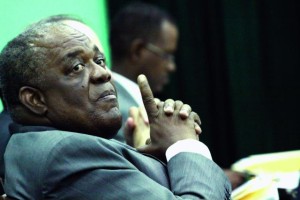
Nassau Bahamas — Prime Minister Hubert Ingraham delivered his crime address Monday night and was short on selling anything new to the country. There was no Three Strikes your out policy for prolific offenders or any plan to stop the illegal number businesses or the Wicked Cash for Gold trading shops, which have been at the centre of the crime crisis.
After dismantling the Urban Renewal Programme and sending marching bands into retreat, where instruments are collecting dust, Papa has now decided to tell us to get involve into a new plan for community building, and here’s what is wrong with politics of the Bahamas!
After stopping, blocking and canceling the youth programme in Andros and Urban Renewal in the country. After cutting subventions to private schools and stopping the construction of schools left in place by the PLP. After raising taxing on books, pencils, uniform, bags, children underclothes [panties and jockey] and most of all the Holy Bible – the one he now is quoting from, the leader of the FNM had the gall after 4 years and five months to tell the young people and underprivileged of this country, “Poverty is not excuse for crime.” Well blow us down!
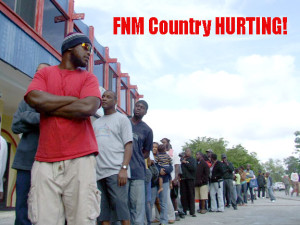
Hubert Ingraham should hang his head down in Nasty ‘Dutty ‘Shame to pin the crime crisis on poor black children. We wonder who stole more than $78 million dollars in public money from the pensioners at CLICO – it sure wasn’t the young boy from Bain Town. We wonder who stole the copper from BEC and ZNS in the government vehicle, certainly not the child from Rockcursher. We wonder which MP is it who refused to declare his millions as required by law? We are almost positive it was not the young boy from Farm Road.
The Crime Problem cannot be placed on the backs of the poor and done in the same fashion as we recalled how Duane Sands called the people of Elizabeth ‘GREEDY’!
Rather than passing the blame on young people, who have been deprived most from the FNM government, the Prime Minister should have joined Perry Christie by saying he BELIEVES IN THE YOUNG PEOPLE OF THIS COUNTRY and that NOT ALL ARE LOST OR WAYWARD!
Perhaps rather than blaming the country’s crime crisis on poor black youths, he should have advised the intention of his government to put those massive, huge numbers of the unemployed Bahamians back to work.
Rather than castigating young people and suggesting that that they are the purveyors of crime, he should have announced some initiative to expand funding for education in technical and trade skills to put by the thousands back to work.
Poverty is no excuse for crime and blaming the poor is no solution to it either!
What was also strange is Ingraham’s suggestion to only find $1 million to throw at Urban Renewal centres, something what he tore apart when returning to office back in 2007.
The Prime Minister said:
There is no denying the role played by young males in the crime scourge of our nation. These males are predominantly from the urban areas of the country, most particularly Nassau and to a lesser degree, Freeport. We cannot bury our heads in the sand about this reality.
To address this reality, the Government will make $1 million available immediately to initiate programmes within urban areas of Nassau and Freeport. These programmes will be developed and executed in conjunction with social partners such as the church, civic groups and sporting groups. The funds for these new initiatives are in addition to the resources that are already budgeted for various urban renewal and youth development programmes in Nassau and Freeport.
When we read this line we wondered what drink the Prime Minister was on. This is the same government which found $6 Million to pave roads now dug-up for the Miss Universe Pageant. This is the same government which found $28 Million to give to 19 wealthy FNM benefactors in the Arawak Port Development Project. The same government which borrowed $70.5 million to build a road from the airport at $10 million per mile. The same government which bought the Ansbacher House at $15 million to find out later the roof was no good. The same government which found over $270,000 to build a bathroom at Saunder’s Beach for more political cronies. And we could go on and on for days, yet, the Prime Minister could only find $1 million for a youth based initiative?
And with all this happening, Papa finds the time to go out with his cronies on the July Rock to go fishing! WELL MUDDOS!
Papa you are LATE AGAIN and is void of ideas. Them same young poor people you blame for crime, will be the same to deliver your government a PINK SLIP at the next General Elections.




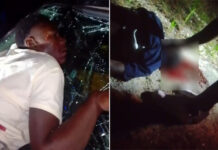
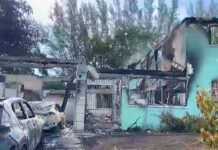
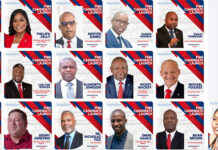

A pink slip and a goodbye Hallmark card!
this is a good write,keep it up.
Under the voodoo directives out of Haiti, The New Republic Of Haiti was underway with no problems or so Bahamians thought. Ingraham had cover until January 2010 when his Haitian spiritual advisor died in the earthquake. Now it is time to see that skillful as it was to have drugs running through the Bahamas under his watch so carefully calculated and destabilizing the country was the plan for 2012. The report says alot which now explains the sudden interest and infiltration of Haitians into the Royal Bahamas Police Force, other government agencies and the legal process were on the way; todate plan is official set where high ranking officers are of Haitian origin with a coup in place as they are the ones who would carry out the attack on unsuspecting people- a Rwandan Genocide unfolding] – By 1985, the cartels began to seek additional transit points for cocaine coming to the United States. A natural candidate was the island country just south of the Bahamas – Haiti. Haiti is a particularly appealing option for drug traffickers because of its location, its weak and corrupt government, and its unstable political situation. The Island of Hispaniola on which Haiti is located, is on the most direct route – barring transit of Cuba – from Colombia to the United States. Haiti has harbors and inlets which afford excellent protection to drug smuggling vessels. Moreover, the Haitian Air Force has no radar facilities and does not routinely patrol Haitian airspace. Drug planes can take off and land freely at any of the island’s numerous secondary airstrips. Since the day of “Papa Doc” Duvalier, Haiti’s government has been notorious for its corruption. The Duvalier family and their associates profited enormously from the protection of many illegal enterprises, including narcotics trafficking. However, until 1987, most of the drug smuggling through Haiti was conducted by individual transportation’ organizations which made their own arrangements with the Haitian government officials. THE COLOMBIANS MOVE IN – Following the departure of Baby “Doc” Duvalier and the presidential elections of 1987, the Colombians took advantage of the complete breakdown of government institutions and began to move into the country in force. They focused their efforts on corrupting key military officers who were in a position to assure that there would be no interference with their operations. According to DEA intelligence, the number of Colombian narcotics traffickers residing in Haiti has been growing daily and the narcotics organizations are now using Haiti as a base of operations, storage site and staging area. In addition, these organizations are buying up legitimate businesses to serve as front companies for their smuggling operations. Once having gained access to local commerce, they then focus on corrupting public officials to protect their interests. The Subcommittee heard a detailed account of the process the Colombians used to establish themselves in Haiti from Osvaldo Quintana, a Cuban-American who became involved in drug smuggling from Haiti to Miami. Quintana later testified about his experience before a Federal grand jury in Miami. He explained that the Colombians established a working relationship with Colonel Jean-Claude Paul by working through a Haitian named Cardozo. The Colombians agreed to pay Colonel Paul, the commander of the Desallines Barracks, for protection and for the use of runway on his ranch for cocaine flights. Command of the Desallines Barracks allowed Colonel Paul to play a pivotal role in Haitian politics because this force is the elite unit responsible for the protection of the Presidential Palace. Colonel Paul’s influence was very much in evidence during the 1987 election, when much of the violence was attributed to soldiers and security officials known as Tontons Macoute acting under his direction. According to Quintana’ the payoffs to Paul were to be made by Cardozo on a shipment by shipment basis. In October, 1986, Colonel Paul became dissatisfied with the amount of money he was receiving and seized a shipment of drugs in protest. The Colombians investigated the seizure and found that their middle man, Cardozo, had been pocketing most of what they thought he had been paying Colonel Paul. The Colombians sent a team of gangsters to Haiti and brought Cardozo back to Colombia, where they brutally beat him for his “theft”. The money was repaid and Paul’s demands were satisfied. Quintana also told the Subcommittee about the efforts Colonel Paul, his wife Marie Mireille Delinois, and his brother made to establish their own cocaine distribution system in Miami. Roger Biamby, a Haitian community leader in Miami, told the Subcommittee that Colonel Paul and other military officers owned ships which sailed between Miami and Haiti carrying cocaine. Quintana’s testimony coupled with that of other witnesses led to the indictment for cocaine trafficking of Colonel Paul and his wife by a federal grand jury in Miami. However, once indicted, they could not be prosecuted because there is not an extradition treaty between the U.S. and Haiti. Further, the Haitian constitution in effect at the time prohibited the extradition of Haitian nationals. Richard Holwill, the Deputy Assistant Secretary of State in charge of Caribbean Affairs was questioned by the Subcommittee on the decision to go forward with the indictment and the issue of coordination between the Departments of State and Justice. He said that the extradition issue and the problem of actually bringing Colonel Paul to trial in the United States was not fully resolved in the pre-indictment meetings between State and Justice. Confronted with a situation where an important military official with a central role in the Haitian government was protecting the narcotics trade, the United States tried to pressure the President of Haiti, Leslie Manigat, to have Colonel Paul removed from the military. However, a coup drove President Manigat from office on June 20, 1988, and Colonel Paul continued to play a prominent role in the armed forces. Political chaos continued after the first coup which placed General Henri Namphy at the head of the government. On September 18′ 1988 a second coup removed General Namphy and brought Colonel Prosper Avril to power. Avril was installed as the new President and Colonel Paul was finally forced to resign. On November 7, 1988, Colonel Paul was found dead. His wife, Marie Mireille Delinois, under indictment in Miami for drug dealing, was detained by Haitian authorities as the murder suspect. THE MIAMI CONNECTION – Roger Biamby testified that government officials in Haiti use a Miami branch of the Tontons Macoute to terrorize the local Haitians into cooperating with smuggling operations. Biamby said that the Miami based Tonton Macoutes are controlled by Lionel Wooley, a Haitian national residing in Miami’s Little Haiti. According to federal law enforcement officials in Miami, Wooley’s gangsters protect crack houses and crack processing plants. They protect the drug shipments, the cash proceeds from drug sales and they insure the silence of the Haitians who have been used to unload drug shipments from the boats on the Miami River. DEA’s OPERATIONS IN MIAMI AND IN HAITI – The Miami police and Drug Enforcement Agency have had great difficulty in development of prosecutable cases against the principal Haitian traffickers in Miami. In order to penetrate the close-knit Haitian society, the authorities rely on wiretaps, informants and undercover operations. However, law enforcement agencies employ a limited number of French-Creole speaking officers, and undercover operations have been limited as a result. DEA regional chief Tom Cash testified that DEA operations in Haiti were also affected by this problem. In Haiti, DEA participates with a Haitian surveillance unit in watching the Port au Prince airport. However, according to testimony before the Subcommittee, the drugs rarely come through the airport, but are instead moved by private ship and plane through other transshipment points. Even if the surveillance provided useful information, U.S. Attorney Gregorie argued that Haiti lacks an honest police force and army to make arrests and punish offenders. Moreover, when Haitian authorities seize drugs from traffickers, the smugglers are not only set free, but the narcotics, instead of being destroyed, are often re-sold by the authorities. In characterizing the Haitian governmental structure, Deputy Assistant Secretary of State Holwill observed that “. . . there is no central government . . . no judicial system . . . and the local army commanders function as feudal lords.” The weakness of governmental institutions in Haiti has made it extremely difficult for the DEA to carry out its mission. The DEA regional chief, Tom Cash, testified that his agency had developed a joint DEA-Haiti Narcotics Center for Information Coordination. He then conceded that because there are no corresponding institutional structures-such as a navy or coast guard-to tackle the narcotics problem, the information center didn’t mean much. He acknowledged, DEA efforts in Haiti are “rudimentary at best.” CONCLUSIONS – There is little hope that serious inroads can be made into the Colombian narcotics trafficking through Haiti until legitimate democratization efforts are undertaken. As long as the Haitian military continues to control virtually every government institution, including the Judiciary and law enforcement agencies, the cartels will continue to operate unchallenged in that country. However, there are steps which could be taken to make it more difficult for Haitians to run their cocaine distribution networks in the United States. One of these might include an immediate review by the Department of State of visas which have been granted to Haitians residing in Miami who are suspected of being involved in the drug trade. For example, two witnesses identified Lionel Wooley as running the Tontons Macoute in Miami and controlling a major cocaine distribution network. He resides in Miami on a U.S. issued visa. His case should be carefully reviewed to determine whether he has committed acts incompatible with his immigration status. In addition, a major effort should be undertaken by drug enforcement agencies to train specialists in the Haitian dialect. There are few law enforcement officials with this skill, which has been a major obstacle to developing effective intelligence operations directed at the Haitian distribution networks. Direct, government-to-government assistance, with the exception of humanitarian assistance provided through private and voluntary agencies, should continue to be prohibited to Haiti until legitimate democratization efforts are underway. The illegal drug trade in Haiti involves trans-shipment of cocaine and marijuana to the United States. It is a major shipment route. The island of Hispaniola, which Haiti shares with the Dominican Republic, places it in an ideal location for drug smugglers, between Colombia and Puerto Rico. Because Puerto Rico is part of the Commonwealth of the United States, shipments are generally not subject to further US Customs inspection after reaching it. However cocaine is often smuggled directly to Miami in freighters. “U.S. government agencies estimate that 83 metric tons or about eight percent of the cocaine entering the United States in 2006 transited either Haiti or the Dominican Republic.”Throughout the late 1980s and into the 1990s, leading members of the Haitian military, intelligence and police were involved in the illegal drug trade in Haiti, assisting Colombian drug traffickers smuggling drugs into the United States. Corruption in Haiti remains extremely high, and suspicions of continued drug-related corruption remain.According to Haitian security expert Michel Laguerre, Haiti became internationally significant in drug trafficking in 1985.According to 1994 testimony to the US Senate by Gabriel Taboada of the Colombian Medellin cartel, a deal had been sealed with Michel François, commander of the Haitian police, in a 1984 visit to Medellin by François.François and other military commanders were said to have protected 70,000 pounds of cocaine shipments in 1987. François was said to have had a landing strip for cocaine shipments built on the property of Col. Jean-Claude Paul, and been paid between $1m and $4m.Taboada also identified General Prosper Avril as involved. Other Colombian traffickers (Enrique Arroyave and Carlos Marcantoni) identified François and General Raoul Cédras as among a group of Haitian military attending a 1987 party in Colombia held to celebrate the Colombia-Haiti drug connection’s shipment of 66,000 pounds of cocaine. The group were said to have been paid $10m for their assistance.The Senate also heard testimony that General Williams Régala and General Henri Namphy were also involved in drug trafficking.After the 1986 overthrow of Jean-Claude Duvalier the US Central Intelligence Agency created the Service d’Intelligence National (SIN), a Haitian intelligence agency. The unit, staffed by officers of the Haitian army, “engaged in drug trafficking and political violence”. The CIA provided half a million to a million dollars per year to train SIN in counter-narcotics, but the group produced no intelligence and instead used their training against political opponents.The members of the unit were known to torture Jean-Bertrand Aristide supporters.After the 1990 elections, new President Jean-Bertrand Aristide’s government sought to restrict the drug trade, and “throughout Aristide’s brief tenure in office, DEA agents worked closely with Haitian military narcotics services, investigating an illegal cocaine network estimated to be moving some $300-$500 million worth of cocaine into the U.S. per year.” Aristide’s actions against drug smuggling may have contributed to his overthrow in the 1991 Haitian coup d’état. After the coup (led by Raoul Cédras), members of the new coup regime, notably Chief of National Police Michel François, were accused of drug smuggling at a much greater rate. After the coup, the local DEA office was shut down, re-opening in 1992. After DEA intelligence then led to the arrest of a SIN member, the local agent received death threats from the arrested man’s boss, and he fled the country.A 1992 US State Department report noted that Aristide was “planning new policies and institutions to combat narcotics trafficking, [and] his ouster…crippled narcotics control efforts in Haiti.”An internal 1993 US Congress memo stated that “all those jailed for drug-trafficking have been released and…Michel Francois has personally supervised the landing of planes carrying drugs and weapons.” The US later indicted François but was unable to secure his extradition from Honduras.A former paramilitary leader of the 2004 Haitian rebellion, Guy Philippe, is also wanted on drug charges. The infiltration of corrupt people into policing, government has indeed placed the Bahamas at war within itself as the poor Bahamians and Haitians pay the price of the decoys used to frustrate them with the pockets well lined in the Bahamas of those who has more and could care less about the safety, sanity of life or whether the tourism goose is killed or not. DUMB DUMB DUMB for trying to close honest people who turn in their own jewelry to the cash for gold centers to get honest money, as the voodoo rituals used by politicians to get elected, police officers to get promoted shows they are totally lost as is Ingraham, corruption and ignorance is a dangerous combination eventually it all comes out. Looking stupid and being stupid really spells voodoo alert in those arenas. LOST TOTALLY LOST.
what will it take for we bahamians to see this FNM is out of touch with us, this man have the whole county f-up hoping to win the next election. he ain’t do chit in 4 1/2 yrs ingrum bring us down to are knees when it come to outsiders he trow money at them but we poor blacks only deserve 1 million lol. plz call election so we could run ya ass out of office cus u doing chit man!!!
…shet ya mout’..! Go away..! Mama, looka Booboo dey…!!
Comments are closed.